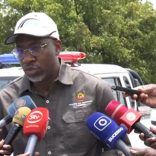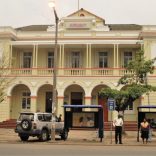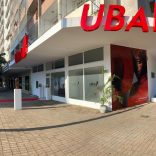Mozambique: Chapo pledges loans for young entrepreneurs
Sedna Africa to deploy private mobile network at Beira Port, Mozambique

FILE - Managing director of Sedna Anton Fester explains that almost every major port on the continent still operates on narrowband technologies with limited data throughput, hampering digital transformation efforts. “This is where mobile private networks come in. They deliver reliable, high-throughput connectivity that is mission-critical for safety, automation, and productivity — whether at ports, in mining, or across other heavy industries.” [File photo: Sedna]
Sedna Africa, a leading provider of industrial IT and connectivity solutions, has secured a landmark contract with Beira Terminal Operator Cornelder de Moçambique, to deploy a Nokia private mobile network at Beira Port in Mozambique — a project that will significantly enhance safety, productivity, and operational efficiency at one of the region’s most critical transport hubs.
The deployment marks a major step in Sedna’s expansion beyond mining into other heavy industry sectors such as ports, manufacturing, and oil and gas, following last year’s structural changes and renewed focus on growth across Europe, Africa, and the Middle East (EMEA).
“Our heritage lies in mining, where we’ve proudly built a strong pedigree supporting industry leaders like Anglo American, African Rainbow Minerals, Zimplats, Seriti, Sibanye Stillwater, Thungela and DRA,” says Anton Fester, Managing Director of Sedna Africa. “But the reality is Africa’s ageing infrastructure simply cannot meet the demands of modern industrial use cases — particularly when it comes to connectivity.”
Fester explains that almost every major port on the continent still operates on narrowband technologies with limited data throughput, hampering digital transformation efforts. “This is where mobile private networks come in. They deliver reliable, high-throughput connectivity that is mission-critical for safety, automation, and productivity — whether at ports, in mining, or across other heavy industries.”
The Port of Beira is a critical maritime facility for Mozambique and Sub-Saharan Africa, and MD of Cornelder, Jan de Vries, says the planned infrastructure and improvement projects aim to significantly enhance its efficiency, capacity, and operational capabilities.
“Improved port infrastructure and efficiency will attract more trade, boosting economic growth. Enhanced capabilities will support industries, create jobs and generate revenue. Modernising, digitising and focusing on safety and automation are critical components of these plans, ensuring the port is future-fit,” he says.
Nokia has already deployed more than 65 private wireless mining networks with over 35 customers worldwide, among them being Sedna installing Africa’s first licensed spectrum private LTE network in South Africa as well as Africa’s first underground leaky feeder licensed spectrum private LTE network enabling production automation, among many other innovations in the sector.
The Beira Port project is on track for deployment, reinforcing Sedna’s strategic intent to support any production-heavy environment where safety helmets and hard hats are standard — and where technology can drive operational excellence.
Sedna Africa has worked with Nokia over the years to assist in solution design and identification of device ecosystems, applying their in-house design and manufacturing capabilities to ensure that dependable networks can be deployed beyond fixed infrastructure limitations, and providing professional services including continuous support to customers.
“We’re using the knowledge, skills, and experience honed in mining to tackle infrastructure bottlenecks across Africa,” adds Fester. “Our expanded offering now includes not only mobile private networks but also OT governance, enabling communication layers, and distributed fibre sensing — helping industries better manage risks, monitor conditions, and avoid costly breakdowns.”
Recent trials in advanced fibre optic sensing technology — embedded within conveyor systems — have demonstrated the ability to detect wear, failures, and fires, enhancing preventive maintenance and safety. “This technology is a game-changer for condition monitoring and risk management,” Fester says.
With operations active in six African countries — South Africa, Zimbabwe, Zambia, Burkina Faso, Senegal, and Mozambique — Sedna Africa remains committed to driving Africa’s Industry 4.0 evolution.
“It feels incredible to be part of something that goes beyond commercial transactions,” concludes Fester. “We talk about the Internet of Things, but I believe Africa needs an Internet of People — connecting not just assets, but communities. Every project contributes to a connected, more inclusive future for Africans.”
About Sedna
Sedna has been providing innovative, sophisticated and reliable digital solutions in the mining industry since 2006. As a pioneer in its field, Sedna has active operations on three continents, employs over 60 engineers, skilled technicians and support staff and counts leading global and regional mining houses among its clients. Sedna continues to build key partnerships with leading OEMs to ensure its clients stay in step with technology advances to maintain a strategic advantage.
These solutions include enabling technologies such as networks (LTE, wired and WiFi), through to Autonomous Haulage Systems, Distributed Fibre Sensing and supplier value management platforms. For all of these technologies, Sedna assists its partners with the entire lifecycle: operational readiness, implementation, integration with other systems and support.
Sedna’s vision is to give business leaders the confidence to maximise opportunities and outcomes by making mission critical decisions based on real-time, system extracted insights they can trust.












Leave a Reply
Be the First to Comment!
You must be logged in to post a comment.
You must be logged in to post a comment.